Fleas are a common problem for pet owners, but do ferrets get fleas? Ferrets can get fleas, and just like with other pets, it’s important to take action if you notice your ferret has them. In this article, we’ll discuss how to tell if your ferret has fleas, what to do if they do, and some tips for preventing flea infestations. So keep reading to find out everything you need to know about fleas in your ferret!
Do you want to know what fleas are, how they reproduce and what signs of them are in your ferret? Do ferret fleas affect humans? Do ferrets get Fleas is an article about the reproduction cycle of the little pests, their impact on our pets’ health, and the best ways to get rid of them.
Fleas are certainly not unique to dogs and cats. Any pet that spends time outdoors, or shares living space with an animal that does, is at risk for flea infestation. This includes ferrets. There are many ways for ferrets to catch fleas from other animals or places they have been. You should take precautions against this pest before it becomes a problem!
Ferret owners may not know if their pets have fleas without looking closely at them or checking their bedding for evidence of an infestation.
What Are Fleas?
Fleas are tiny, reddish-brown insects that live by sucking the blood of their hosts. They are parasites, which means they cannot survive without a host to feed on. Fleas can jump up to 18 inches high, making them expert hitchhikers!
There are many different types of fleas, but the most common one that affects pets is the Ctenocephalides felis , or cat flea. This type of flea will bite any warm-blooded animal, including dogs, cats, ferrets, and people.
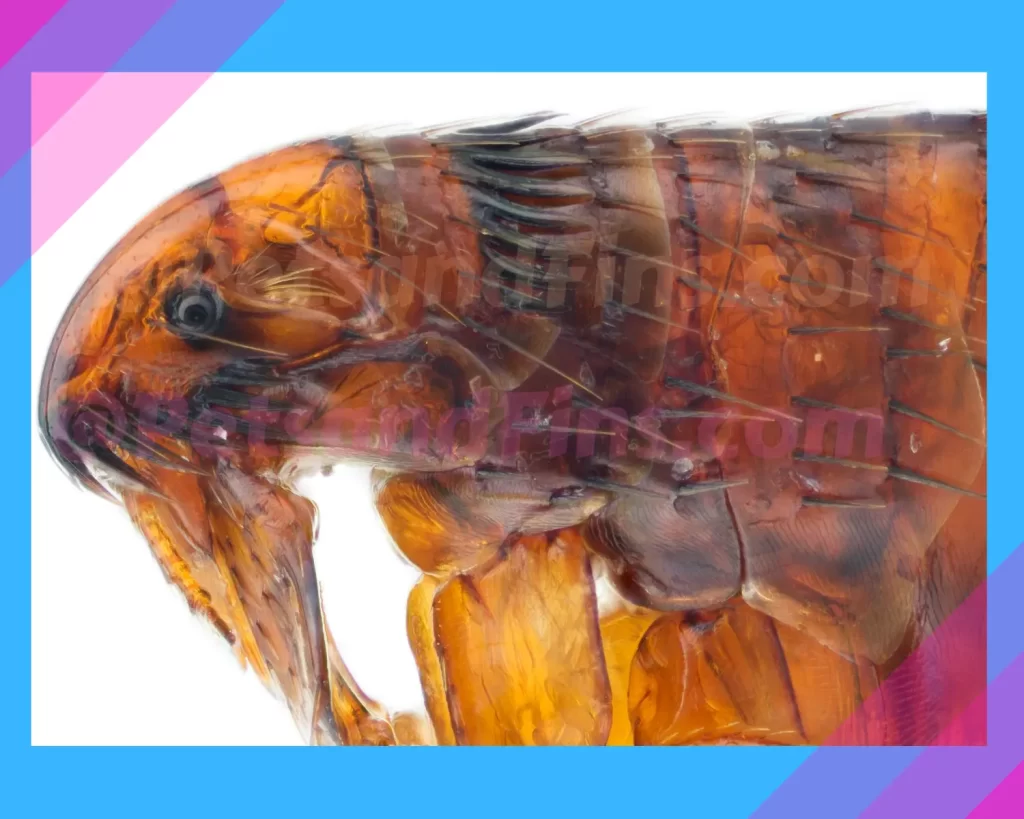
They can be found on the bodies of animals and in their environments, such as in carpets or bedding. Fleas thrive in warm environments and go through a rapid reproduction cycle.
The most common sign of fleas on an animal is scratching. Pets may also exhibit hair loss, reddened skin, and black specks (flea dirt) in their coat. If you see any of these signs, it’s important to take action right away to get rid of the fleas before they cause further health problems for your pet.

What Is The Reproduction Cycle Of Fleas?
Fleas go through a complete life cycle consisting of four stages: egg, larva, pupa, and adult. Eggs are laid on the host animal or in their environment. Larvae hatch from eggs and feed on any organic material available, including the feces of adult fleas.
The larvae pupate in order to transition into adults, which are capable of reproducing and starting the cycle over again. The complete cycle usually takes about a month to occur, depending on environmental conditions.
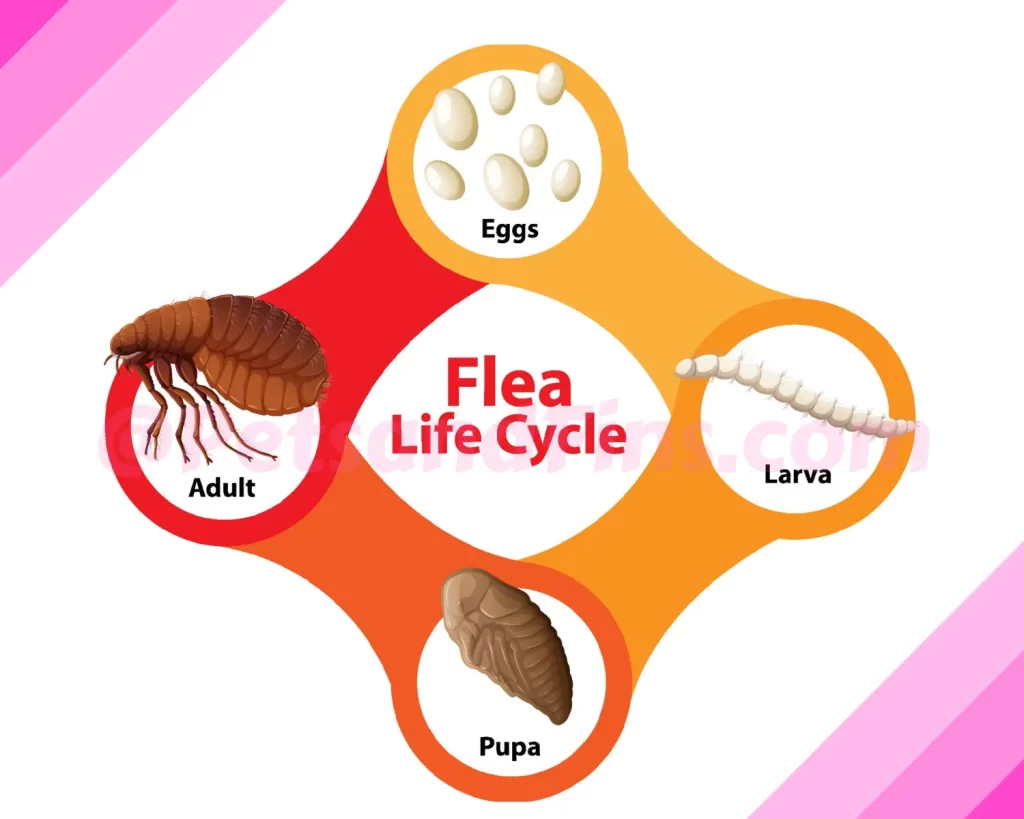
This life cycle can be broken down into three steps: egg, larvae, and pupa. If your pet contracts fleas in any of these stages, they will continue to reproduce until you get rid of them completely.
Throughout this process, the fleas will go through several generations as more eggs are laid each time an existing generation dies off or reproduces with another member of its species. This is why controlling the number of adults is important for treating infestations effectively!

Do Ferrets Get Fleas?
Ferrets can get fleas.They are susceptible to fleas, just like any other animal. In fact, the most common health problem seen in ferrets is flea infestation.Fleas can be a particular problem for ferrets because they can carry and transmit a number of diseases, including bubonic plague, typhus, and tapeworms.
To keep your ferret flea free, it is vital to regularly change bedding and thoroughly vacuum carpets and floors. It is also a good idea to put a flea spray in all corners of the room where your ferret sleeps or plays.
You can use a little dish soap mixed with water, a couple spoonfuls of apple cider vinegar mixed with water to kill them at home if you cannot take your pet into the veterinarian.
If you have any pets in the household it’s important they get treated too.It’s important to make sure your ferret is on a regular flea preventive medication and that you keep an eye out for any signs of flea infestation.

What Are The Signs Of Fleas In Your Ferrets?
The signs of a flea infestation in ferrets can be similar to those seen in dogs and cats.
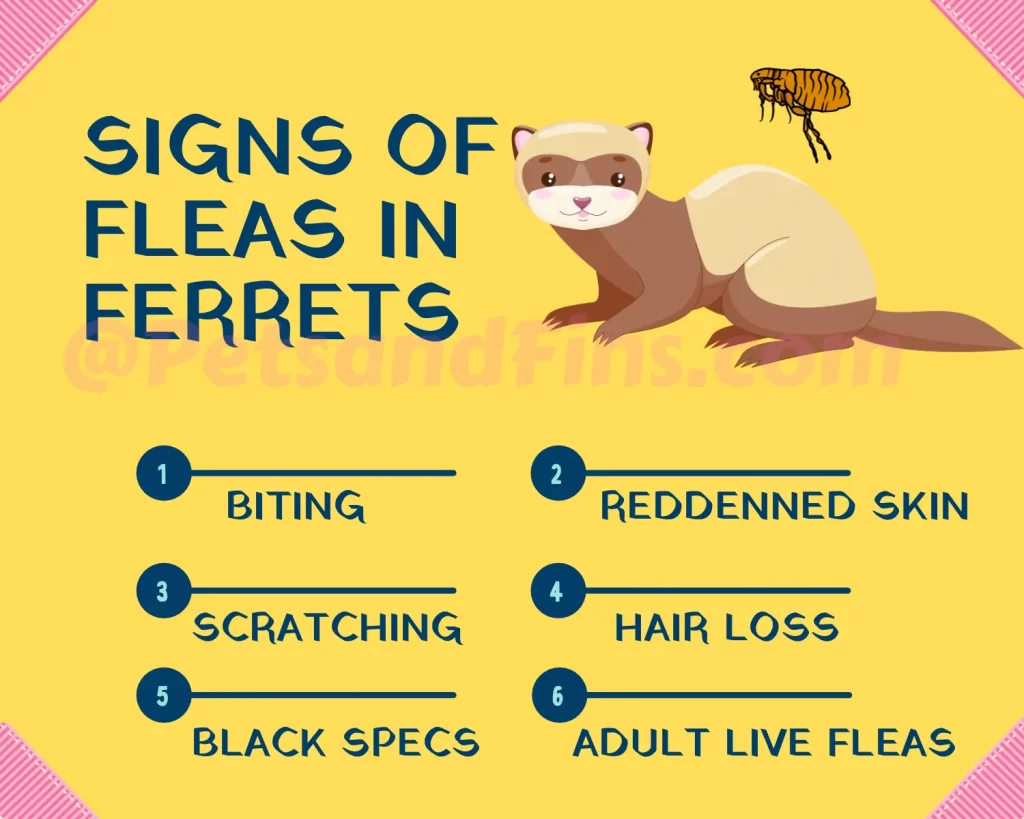
Most common symptoms include:
- Biting
- Reddened Skin
- Scratching
- Hair loss
- Black specks (flea feces) on the coat or bedding
- Presence of adult fleas .
If left untreated, numerous bites over time can lead to anemia in ferrets.If you see any of these signs, it’s important to take action right away to get rid of the fleas before they cause further health problems for your pet.
Fleas can also transmit other diseases and parasites to pets, including tapeworms. So it is important to treat both the fleas themselves and any underlying conditions that may have led to your pet getting them in the first place.
If left untreated, a flea infestation can lead to a condition called Flea Allergic Dermatitis (FAD), which is an allergic reaction to the saliva of fleas. This can result in excessive scratching and biting, leading to skin lesions that can become infected. FAD is not limited only to pets; humans can also be affected by it!
Fleas can transmit other, more serious diseases to pets, such as tapeworms, Bartonella, and plague. So it’s really important to take action if you think your pet has fleas, even if they don’t seem to be scratching or biting a lot.

How To Check For Fleas In Ferrets?
If you suspect your pet has fleas, there are a few simple ways to check for them.
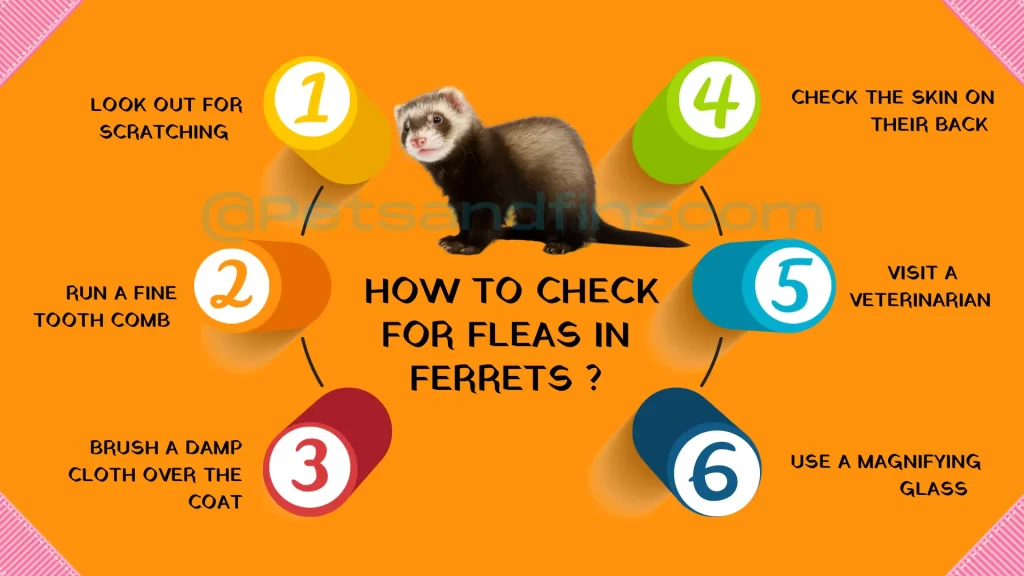
- Look Out For Scratching :Many pets will show signs of scratching and biting when they have an infestation, but these may not always be present.
- Check The Skin On The Back :One way is to look closely at your ferret’s skin on the back of their neck- this area tends to get a close examination from a grooming ferret!
- Run A Fine Tooth Comb:You can also run a fine tooth comb through their fur in order to detect any black specks that might indicate adult flea dirt.
- Brush A Damp Cloth Over :Another is to brush a damp cloth over the animal’s coat and then look for black specks (flea dirt) that will dissolve in water.
- Use A Magnifying Glass:You can also use a handheld magnifying glass to look for adult fleas on your pet’s skin.
- Visit Your Veterinarian:If you want some more conclusive results, it’s easy enough to take a quick trip down to your local veterinarian or pet store, who can help with diagnosis and treatment options if necessary.
One thing worth mentioning is that fleas are not limited to just furry pets- they can also infest birds, reptiles, and even amphibians! So if you have any other types of pets in your home, it’s a good idea to check them for fleas as well.
How Do Ferrets Get Fleas?
There are several ways that your ferret can catch fleas.
The most common way is through direct contact with another animal who has them, but they also have the potential to pick up eggs or larvae from their environment .
Here’s How Your Pet Might Catch Fleas:
Being In Contact With Another Animal That Has Them : The surest way for a pet to get fleas is by being in close contact with an infested dog or cat- even just sharing space indoors or outside will be enough! If you suspect this might be caused by your pets’ playing together and coming into physical contact with each other, it could be worth having a quick look at both of them.
Through The Environment:It’s also possible for a pet to get fleas from contact with objects in their environment that have been infested, such as bedding, carpets, or furniture. So if you’ve recently moved and your ferret is scratching more than usual, it might be worth checking all of these places for signs of fleas.

Are Ferret Fleas Harmful to Humans?
Just like any other type of flea, ferret fleas can bite humans- and in some cases, this can lead to an allergic reaction.
This is known as Flea Allergic Dermatitis (FAD), and symptoms include itchy skin, redness, swelling and even blistering.If you think you might be affected by FAD, it’s important to see a doctor for diagnosis and treatment. There are various medications available that can help relieve the symptoms.
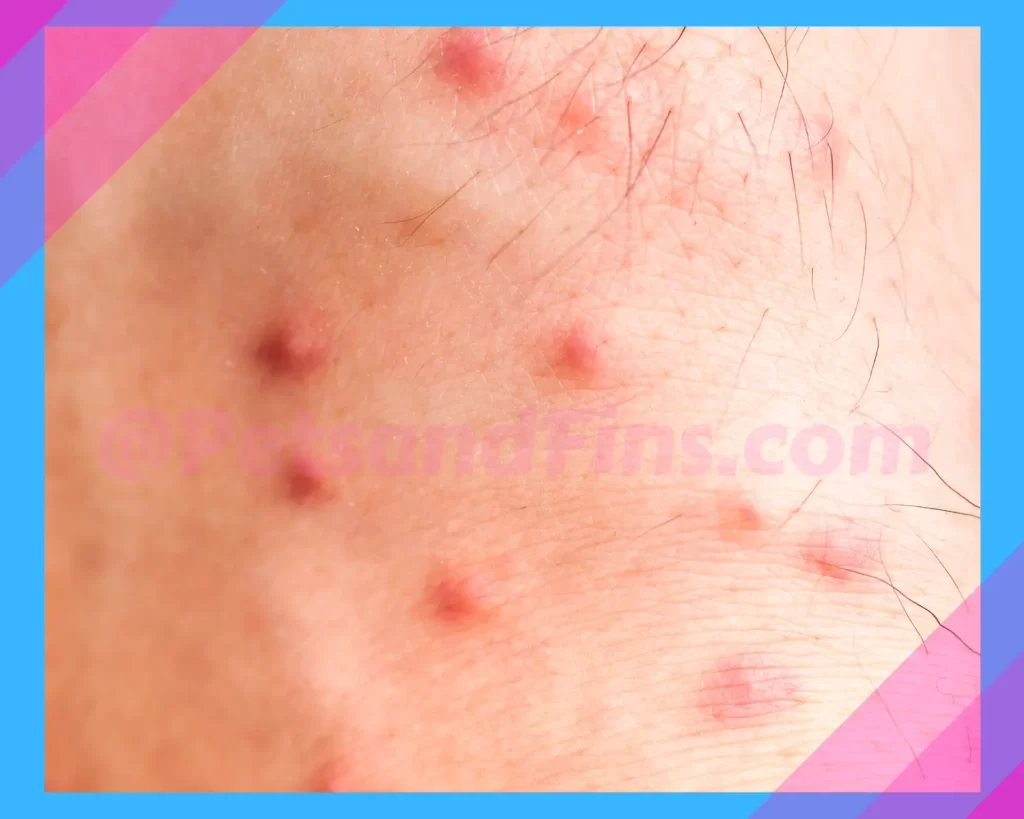
Ferret fleas do not specifically target humans, but they can bite us if we happen to be in the wrong place at the wrong time! So if you’re around your pet and start feeling itchy all over, it’s best to take a look and see if there are any fleas around.
If you’re already taking steps to prevent your ferret from getting fleas, it’s important to remember that these measures will also help protect you and your family as well! There are a variety of products on the market that can be used to treat both pets and their environment, so talk to your veterinarian or pet store for more advice.
There are other, more serious diseases that fleas can transmit to both pets and humans. One of these is called bubonic plague, which is a serious infection caused by the bacteria Yersinia pestis .Although this disease is rare in America, it’s still important to be aware of the risks and take steps to protect yourself and your pet from fleas.

How To Prevent Your Ferrets From Getting Fleas?
The best way to prevent your ferrets from getting fleas is to use a combination of regular grooming and preventive medications. There are several different products on the market that can be used, but consult with your veterinarian before starting anything new.
There are also some things you can do around the house to help reduce the chances of an infestation happening in the first place.
If you’ve never had a problem with fleas before, it’s always best to take the necessary precautions. Most of these measures will also help protect your pet from other diseases and infections as well!
- Keep Your House Clean:One way to prevent your ferrets from catching fleas is by keeping your house clean. This means regularly cleaning carpets and soft furnishings where they like to sleep or lounge around.

It might be an idea to invest in some bedding that can be washed at high temperatures (60 degrees Celsius), such as fleece fabrics, which are easy enough for even amateur sewers to make themselves .
- Vacuum Regularly:In addition to keeping your house clean, it’s also important to vacuum regularly. This will help remove any eggs or larvae that might be lurking in the carpet or furniture.
- Groom Your Pet:Regular grooming is another key way of preventing fleas from taking hold. This includes brushing their coat regularly (preferable every day) and checking for signs of fleas or flea dirt.
- Keep An Eye On Your Pet:The best way to prevent any health problems associated with fleas is to keep an eye on your pet. If you see any of these symptoms, it’s important to take your ferret to the veterinarian for a check-up:
– Excessive scratching or biting of fur
– Visible fleas or flea dirt in their coat
– Redness or inflammation around the neck, shoulders, or base of the tail
– Lethargy or poor appetite
– Weight loss
- Use A Preventative Medication:There are a variety of different preventive medications available on the market that can be given to your ferret as part of their regular healthcare routine. Fleas may cause serious health problems for your ferret if you don’t apply flea prevention on a regular basis.
Using a monthly topical flea preventive is the simplest approach to keep fleas away from your ferret. This prevents fleas from returning to your pet without the hassle of administering an oral medicine. If you use a flea-preventative treatment that is not particularly designed for ferrets, you might be putting your pet at risk.
These range from spot-ons and tablets to shampoos and powders, and most can be purchased from your veterinarian or pet store. It’s important to remember that not all flea products are safe for use on ferrets, so always check with your vet before starting any new treatment.

How To Get Rid Of Fleas In Ferrets?
If you’ve already got a flea infestation in your ferrets, it’s important to take action quickly to get rid of them. There are a variety of different products available to treat both pets and their environment, but it’s always best to consult with your veterinarian first.
Products that can be used include:
Flea shampoos
Flea powders
Insecticidal sprays or dips
Oral medications such as tablets or chewables
Spot on treatments
All of these products can be purchased from your local pet store or veterinary clinic. It’s important to read the instructions carefully before using the product, and always follow the safety guidelines.
It might also be necessary to treat all of the animals in your household, as fleas can easily jump between them.
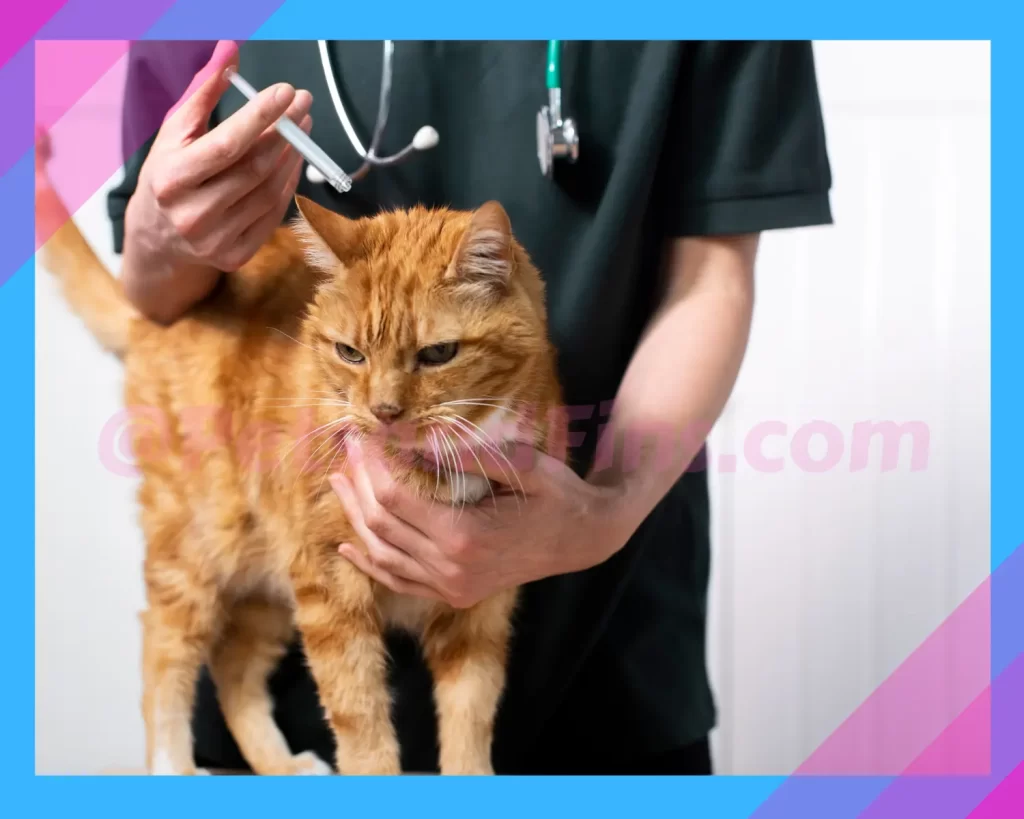
If you have any questions or concerns, please don’t hesitate to contact your veterinarian. They will be able to help you choose the best treatment for your pet and advise you on how to prevent future infestations.
In addition to this, there are some other steps you can take at home:
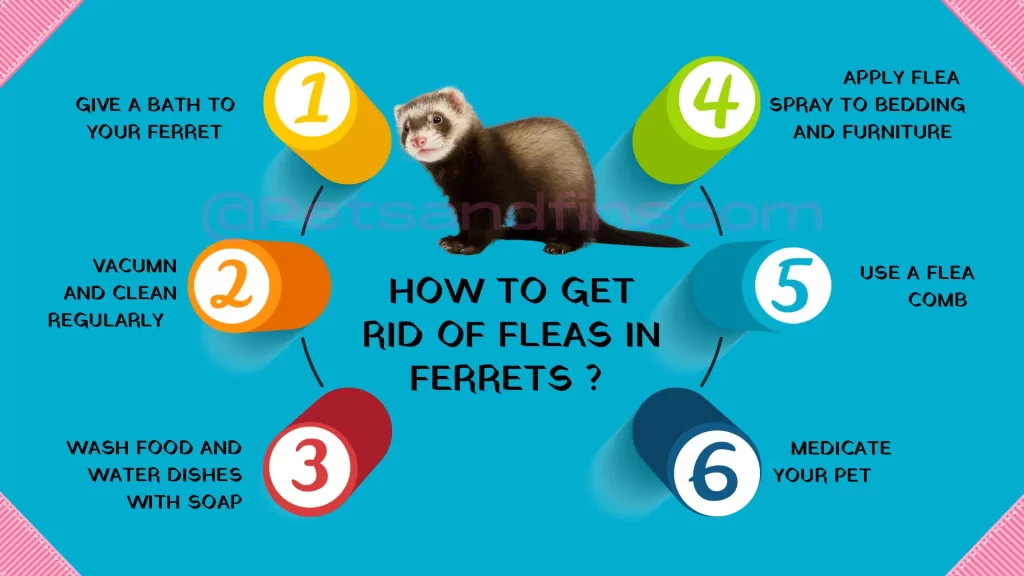
- Bathe Your Ferret In Warm Water With A Mild Shampoo:Washing your ferrets with shampoo will help remove any adult fleas that might be present on your ferret’s skin and fur. Do not use human shampoos- instead, talk to your vet about an appropriate product for pets.
- Clean And Vacuum Regularly:It’s important to vacuum regularly, but also wash bedding and soft furnishings where the ferrets like to sleep or lounge around. This will help remove larvae and eggs that may have been left behind by the adults. Do not forget areas where they like to play outside of the house too, such as the garden.
- Wash Food And Water Dishes With Soap:It’s also worth checking food and water dishes for any signs of eggs or larvae, which can be removed with soap and hot water before being left to dry in the sunlight.
- Apply Insecticide Powder Or Spray To Their Bedding And Cage Furniture:There are several insecticides available that can be used safely in conjunction with regular vacuuming- just make sure to follow the instructions carefully.
- Use A Flea Comb:A flea comb can be used to help remove any fleas or eggs from your ferret’s coat- just make sure to do it outside or in a well-ventilated area!
- Give Your Pet Oral Medication:If your vet feels that oral medication is necessary, they will prescribe a suitable product. This should be given alongside regular bathing and using an insecticide powder or spray.

Advantage II And Flea Control In Ferrets:
Advantage II for small cats measuring 5-9 lbs has now been approved to be used on ferrets. Ferrets must weigh at least 1 pound and be at least 10 weeks old. This efficient topical flea preventive destroys all phases of the flea lifecycle, including flea eggs and larvae, and provides month-long protection against adult fleas.
This aids in the prevention of reinfestation. Advantage II is simple to use and waterproof, so it will keep your ferret safe even if it gets wet. Even showering won’t affect the efficacy as long as you use a soap-free shampoo.
This ferret flea preventive has two active chemicals that work together to provide optimum flea control for ferrets. The first active element, imidacloprid, damages the neurological system of the flea, causing paralysis and death. After about 12 hours of treatment, 98-100 percent of fleas will be killed.
The second active component in Advantage II, pyriproxyfen, stops flea eggs from hatching, which prevents the development of all future flea life stages, thereby ending the flea life cycle.
Another advantage of Advantage II is that fleas are destroyed on contact, which means your ferret does not have to be bitten by a flea for the active components to work. Flea bites often trigger skin allergies, which may lead to itching, inflammation, and hair loss. Fleas may transmit tapeworms to pets, so removing them before they bite is critical to your ferret’s general health.
It’s important to remember that if you’re dealing with a severe infestation, you might have to take some additional steps, such as fogging your house or even putting your pet on antibiotics . Consult with your veterinarian for more information.
Wrapping Up
Ferrets are mammals and can carry the same parasites as other animals. Some flea treatments work for both cats and dogs, so it’s worth checking with your vet to see what he or she recommends before using any household remedies on your small furry friend.
Fleas in general are not good because they spread diseases quickly through their bites that can lead to anemia or even death without treatment by a veterinarian.
Be sure to groom your pet often–especially when outdoor conditions change–to make sure no pesky critters hitchhike home with them! And remember, all pets deserve regular veterinary care throughout their lives, including annual exams, vaccinations, and preventative care like tick/flea prevention.
I hope this blog post has answered any related questions you had about ferrets and fleas! If there is anything else I didn’t cover in detail or if you still have more specific questions on this topic, feel free to reach out with your concerns by clicking the contact button below. Our team of experts will be happy to help answer any queries related to ferret behavior and care!
XoXo
Genie
